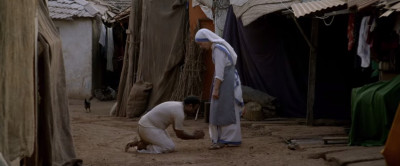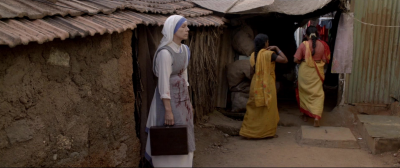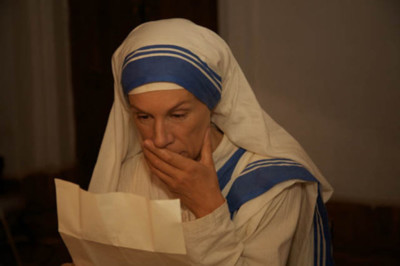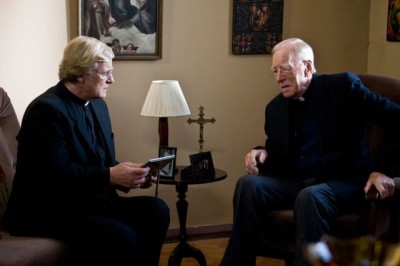Mother Teresa. Her name. Her face. Her charity. All world renowned. And rumor has it she will finally be given sainthood in 2016. But who was the woman underneath the famous white and blue robes that walked the streets of Calcutta for so many decades? With THE LETTERS, writer/director William Riead seeks to answer that very question.
Based on decades of letters written by Teresa to her spiritual advisor Fr. Celeste van Exem, THE LETTERS is framed as a look back at her life via Benjamin Praagh, a postulator investigating Teresa for possible beatification (a rung on the step to sainthood) and his interviews with van Exem who had Teresa’s letters. We hear from van Exem as he relates her story, speaking the long unspoken; Teresa suffered from great inner turmoil, emptiness and loneliness, at times even losing her faith in God but never losing her faith in her work, her destiny.
Going back in time to Teresa’s days as a teacher at Sisters of Loreto’s Calcutta school for girls, the chronology unfolds, from her horror at the poor and destitute seen from the safety of the convent to her years long battle for decloistering so she may go out into the poor and serve them to the birth of the Missionaries of Charity to her awarding of the Nobel Peace Prize. Throughout, we have the benefit of narrative through Fr. Van Exem’s telling of THE LETTERS. The one shortcoming, however, is while we hear of her loneliness and emptiness, we don’t really see that much of it as the film focuses on her charity work and her presence among the people. Where we feel the loneliness and emptiness is through watching Juliet Stevenson’s spellbinding performance as she speaks with her eyes, subtle nuances with her hands, a stoop of the shoulders, showing us more about a very private woman than any string of dialogue.
Why no one is as yet talking about Juliet Stevenson for awards consideration is beyond me. Now in her late 50’s, Stevenson plays Mother Teresa from age 35 to 70 with a believability and resonance that radiates from within. The depth of conviction and humility which she imbues in the character took my breath away. Her physical stance, nuanced movement and motion; you feel the onus of life on Teresa’s shoulders. Powerful fragility at its finest. And when she smiles that little smile, genuine warmth emanates.
As Fr. Celeste van Exem, Max Von Sydow is the embodiment of paternal kindness, concern and generosity of spirit. Particularly impressive is the casting of Aapo Pukk as the young van Exem. Pukk manages to capture Von Sydow’s physical movement to cement the generational connective tissue. The man who kicks off the story, postulator Benjamin Praagh, is given a strength of conviction thanks to Rutger Hauer. Like Von Sydow, minimal screen time, but Hauer makes the most of every minute.
Riead’s construction is effective and extremely well paced. The story completely engrossing. Interesting is that while we know Teresa was Catholic and the Vatican is an integral part of her story, the film – like Teresa’s work – is essentially devoid of preaching Catholicism or any religious bent, but for some procedural elements.
A lesson in humility. An eye-opener on a woman who touched the world. THE LETTERS is one film that captures the true spirit of the season.
Written and Directed by William Riead
Cast: Juiet Stevenson, Max Von Sydow, Rutger Hauer, Aapo Pukk

















